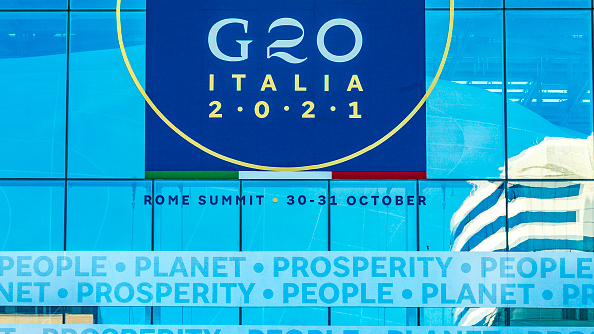Andrew Korybko

Huge banner announcing the G20 Summit on the glass wall of the Nuvola Congress Center in Rome, Italy, October 27, 2021./Getty
Chinese President Xi Jinping on October 30 addressed the 16th Group of 20 (G20) Leaders’ Summit in Rome via video link, reminding its members of their global responsibilities to sustainably develop their economies, reduce emissions, and perhaps most importantly, to urgently cooperate in order to end the COVID-19 pandemic as soon as possible.
The last of these suggestions saw the Chinese leader elaborate on exactly how this could come about while introducing his Global Vaccine Cooperation Action Initiative (GVCAI).
First, vaccine research and development must be strengthened in partnership with developing countries. Second, developing countries should have equitable access to vaccines. Third, vaccine IP rights should be waived and such technology be transferred to developing countries. Fourth, cross-border trade should be scaled up to facilitate access to raw vaccine materials and their final products’ equitable export. Fifth, all vaccines should be treated equally. And sixth, developing countries need financial support for purchasing vaccines.
The GVCAI is very pragmatic. In fact, all of what President Xi proposed should already have been happening. The fact that it hasn’t yet come to pass speaks to how some major countries’ self-interested policies have inadvertently extended the pandemic. Some of them such as the U.S. also take a politicized stance toward the virus’ origins instead of respecting the scientific data from the World Health Organization’s study earlier this year.
The pandemic wasn’t the only topic of discussion that the Chinese leader touched upon during his speech, as was earlier mentioned. President Xi also criticized the formation of exclusive blocs, which he warned will only harm scientific and technological innovation. He advised major economies to responsibly manage their economies with the proper policies that ensure there isn’t any negative spillover for developing economies, which is crucial as the global economy begins to recover.
A staff member checks tags on vials of COVID-19 vaccine at a packing line of Sinovac Life Sciences Co., Ltd. in Beijing, capital of China, December 23, 2020. /Xinhua
President Xi’s remarks about climate change were also important. He said that developed countries should lead by example when it comes to emissions cuts. This reinforces the suggestions made in his country’s white paper on climate change that was released on Wednesday. It’s unrealistic to expect developing countries to do the same as developed ones in this respect or at an equal pace. The developed countries should therefore lead the way like President Xi advised.
These three pillars of his speech served to remind the organization of its global responsibilities to mankind. The G20 is one of the world’s most influential assortments of countries besides the United Nations. Its members collectively contribute to the vast majority of the global economy and international trade. Moreover, they represent approximately two-thirds of the planet’s population. Be that as it may, only a few developing countries such as China are represented there.
Since the People’s Republic of China is the largest developing country, it’s consistently felt the responsibility to defend the interests of its peers across the Global South. This explains why President Xi specified in his speech that the global economic recovery, policies against climate change, and efforts to end the pandemic shouldn’t come at the expense of developing countries. To the contrary, their interests must be respected, without which global inequality will only worsen and people’s lives will become much more difficult.
Should the G20’s members end up following President Xi’s advice, then everything will eventually improve for everyone. The “community with a shared future for mankind” that China’s worked so hard to create can become a reality. Mutually beneficial cooperation is the way of the future, not the zero-sum games that some major countries like the U.S. are playing. Only the true multilateralism, which China champions, can save the world from its many crises.
Andrew Korybko is a Moscow-based American political analyst.
 Africa -China Review Africa -China Cooperation and Transformation
Africa -China Review Africa -China Cooperation and Transformation
